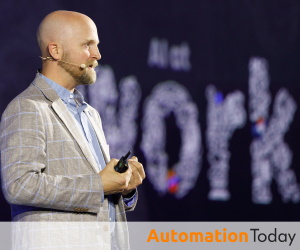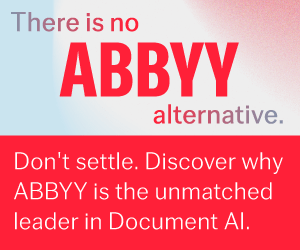
The AI revolution is here, it’s real and businesses can leverage it now.
That was the message delivered during Graham Sheldon’s keynote address at Forward VI—enterprise automation technology provider UiPath’s annual user conference in Las Vegas. Forward has evolved into one of the largest events in the software automation world and Sheldon, the New York City-based company’s chief product officer, brought UiPath’s theme for the week—AI at Work—to life in his address as he looked at what is coming for the company’s AI-driven platform.
AI + Automation = Magic
Sheldon, who spent two decades at Microsoft where he was responsible for scaling its wildly successful Teams product to 300 million users and worked directly with CEO Satya Nadella, has been with UiPath for nearly a year. And it was his work with Teams that eventually catalyzed his understanding of automation and brought him to UiPath.
“Teams was a system of engagement, so as I was launching it, I’d have conversations with executives asking what platforms they wanted Teams to play well with from a strategic standpoint,” Sheldon told Automation Today in an interview after he came off the keynote stage at Forward. “It became apparent that there were three pillars needed: a system of engagement (Teams), a system of record (their ERP or CRM technology) and a system of automation. They had disparate systems and automation crossed them all.”
Since moving to UiPath as its CPO, Sheldon has strived to add functionality and position the company’s offering as a fully realized business automation platform and the evolution of AI has made that a reality. AI has been part of UiPath’s offering for some time, he says, but they’re putting more emphasis on it than ever as they continue to add more AI-powered features to the platform.
Sheldon emphasized a new AI solution in a demo on stage at Forward with Autopilot for Assistant, an AI companion that helps anyone tackle their daily task list. It securely blends Generative AI and Specialized AI to work with a wide variety of systems and documents. Autopilot, he said, makes it easy to run existing automations and can even use AI to create new ones on the fly when needed. In the demo, Sheldon showed how Autopilot for Assistant can automate anything from filling in a new invoice, creating a new Slack thread to notify team members when an action has been completed in a workflow, or even ordering lunch.
As he said in his keynote, Sheldon feels “AI plus automation is magic.”
Mind and Body
In his keynote and again in his sit-down with Automation Today, Sheldon remarked that AI without automation is “like a brain without a body.” AI lacks the critical context and input that automation provides. And by itself, AI cannot take action on the insights it can make.
“AI is transformative, but what can it do by itself?” Sheldon asks. “Not much. You need appropriate context and you may need to empower it with the right actions in order for it to be useful. It can’t take those actions unless it sits on top of an automation platform.”
And the platform, by integrating specialized AI and generative AI (with connectors to a variety of providers including Open AI, Microsoft, AWS, Google and Anthropic), is enabling end-to-end automation solutions that are easier to build and maintain for professional and citizen developers alike.
First-Year Challenges
For Sheldon, the notion of seeing UiPath’s platform operating as a unified whole is an exciting new area of an accomplished professional life, but one that requires a dedication to learning.
“The automation space sits at the intersection of many markets,” he notes. “So ramping up on all of them has made for a challenge as I come to the end of my first year in the business. Low-code, intelligent document processing, natural language processing, business process management are all integral to the space. So, you’re not ramping up on one space, you’re ramping up on 10 all at the same time. It’s a continuous education.”
Communicating how the AI revolution will affect all UiPath’s stakeholders and the importance of embracing it is also an ongoing responsibility Sheldon takes extremely seriously.
“People have been worried about AI and how it fits into our business,” he says. “Customers have been worried, partners have been worried, our employees have been worried. All are concerned about what an AI revolution means for them. I have to convince them that it’s a tailwind, not a headwind.”
He notes that his success with Teams has given him some of the credibility he needs to make his arguments even more convincing. At Microsoft he says he learned about “manufacturing success,” using obsessive attention to detail, accepting and acting on feedback, being able to demonstrate small gains both internally and externally. And finally, showing growth, even if it is small at the beginning. Creating small wins in these ways has translated into winning over the constituencies he needs.
Little by little, Sheldon says he is making them believe that fully embracing AI and the radical ways it is evolving will enable the UiPath platform to maintain its position atop the business automation space by adding to what’s always been in UiPath’s DNA.


